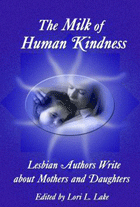 The
Independent Gay Writer is proud to offer a review of a newly minted
anthology of lesbian writers, edited by Lori L. Lake—The Milk of Human Kindness
The
Independent Gay Writer is proud to offer a review of a newly minted
anthology of lesbian writers, edited by Lori L. Lake—The Milk of Human KindnessCheri Rosenberg, one of our most prolific book and film reviewers, does the honors with her review
 The
Milk of Human Kindness: Lesbian Authors Write about Mothers and
Daughters
The
Milk of Human Kindness: Lesbian Authors Write about Mothers and
Daughtersedited by
Lori L. Lake
Regal Crest Enterprises
Pub date: November 5, 2004
The Milk of Human Kindness: Lesbian Authors Write about Mothers and Daughters, edited by Lori L. Lake, is an anthology of stories and memoirs that will touch your heart and stay with you long after the last page is read. Twenty-three talented authors have shared their feelings about the complex relationship between mothers and daughters
through fiction, essays, or memoirs.
This fine collection of short stories may have been written for a gay audience, but straight women will enjoy The Milk of Human Kindness and learn from it as well. The fact that mother/daughter relationships are often fraught with issues makes it no surprise that this anthology has something to offer everyone. According to Lake, “the experiences are not just lesbian-related, though they certainly are lesbian-themed. Anyone who has had any sort of mother/daughter relationship will surely feel for so many of the characters. Lots of angst, regret, and grief in the book—but also some unexpected humor. It was an interesting thing to put together.” I agree with Lake and I can tell what a labor of love this project was for her. Her time and effort paid off in producing a well-written, insightful collection of literature.
Everyone craves unconditional love and acceptance by the person who nurtured them—regardless of sexual orientation. The anthology encompasses thoughts of daughters and mothers; it spans a few generations to give different points of view. Katherine V. Forrest asks, “Does the need for a mother ever leave?” Perhaps not. Forrest continues, “Among women, our deeper friendships contain, along with love and warmth, elements of nurturing, protectiveness, guiding, mentorship, and wound-binding.” Women need each other on many different levels, and the fortunate ones have at least one woman in their lives—be it their mother, lover, or friend—who fulfills this need. The Milk of Human Kindness depicts many aspects of the human condition.
Lori L. Lake’s fiction, "The Bright Side," shows how a mother’s criticisms can deeply affect her daughter. In this story we see a mother who is so critical of her daughter she compliments her on her weight loss even though it is due to chemotherapy for breast cancer! In addition, she is disappointed that her daughter is gay and throws it in her daughter’s face—even during a family crisis. This is not to say that we don’t love our critical mothers, but our mothers’ unfavorable comments often hurt the worst.
In "Train Tracks", fiction by Cameron Abbott, a simple question between sisters discussing their ailing, possibly dying mother, “Has she asked for me?” evokes emotions of a daughter who against all odds still yearns for unconditional love by a mother who never accepted her.
"The Tuesday Before Thanksgiving," fiction by Georgia Beers, is about a mother with preconceived notions and prejudice regarding her daughter’s sexuality. By the time she accepts her, she reads in the paper, “President Bush says 'No' to gay unions,” and her heart aches for her daughter. Her tune changes from, “My daughter is a lesbian,” to, “My daughter is happy.”
The memoir by Carrie Carr, "Hiding in Plain Sight" is about one woman’s journey from self-hatred and despair to self-love and happiness. Carr shares a hard-earned and important revelation when she writes, “Sometimes, the only person you are hiding from is yourself,” when she was sure that coming out would ruin her life. She was fortunate to gain the love and support of her family and find a loving partner. She learned a very valuable lesson and by sharing her story, she taught a lesson as well.
Karin Kallmaker’s witty and insightful memoir, "Dangling Earrings," tells how her mother taught her the importance of what others think. Nice girls don’t wear flashy earrings. She in turn wants to teach her children “…how they feel about themselves, on the inside, is more important than the opinions of strangers.”
"Grandmother’s Cup," fiction by Lois Cloarec Hart, shows how a mother/daughter’s love is as irreplaceable as an antique cup. It is precious and should be cherished.
"Mother Memoir: A Coming Out Story" by Ellen Hart is heart-warming. Hart writes, “I understand now that love was the bridge over which we met and talked, and finally, where we healed the wounds of our differences.” Brilliantly put.
Jean Stewart writes a memoir titled, "World Without End," that you won’t soon forget. "World Without End" tells about painful memories of child abuse by her father and how her mother stood by silently and didn’t intervene. Stewart writes, “I became the sacrifice my mother made to my father’s anger.” Stewart’s father could not accept his daughter and while her mother could, she would not jeopardize her marriage to save her daughter from her father’s wrath. Stewart gets past the physical and psychological pain she endured from her parents by finding love in her life. She writes, “Finding love does that; it gives you the strength and good will to reach out and reconnect, even with people who have hurt you.”
Radclyffe shows how “Don’t ask, don’t tell” can be as damaging as disclosing the truth. She ends up with an even stronger relationship with her mother because her mother asked—and she told. It touched me when her mother confronted her about being a lesbian and she answered truthfully, thereby creating an even stronger bond with her mother. "Don’t Ask, Don’t Tell or…The Day My Mother Broke the Silence" is an inspiring memoir/essay by Radclyffe.
Lake has stated, “When it comes right down to it, sexuality may be fluid, but the themes of life that all human beings must deal with are universal. I mean, really—it's a failure of imagination for people not to "get" the full range of human sexuality! And to my way of thinking, it's not SEX that matters, it's the relationships.” Therefore, why shouldn’t mothers, fathers, and ultimately society, accept their daughters?
The Milk of Human Kindness is about the most important relationship of all—our first real relationship that means the difference between life and death—the relationship we have with our mothers. Each author has added her own personal touch and writing style. It was enlightening and enjoyable to read each story as a separate entity and be able to relate to them all. I strongly feel that The Milk of Human Kindness should be included on the syllabus of every Human Sexuality and Women in Literature course; it should be required reading along with Betty Freidan and Simone de Beauvoir. You will be tempted to check out the other works of each author after reading their stories. The Contributor Bibliography at the back of the book offers an easy reference for the authors’ published works. Don’t miss this five plus star collection. Lake has entertained the thought of putting together an anthology of stories written by lesbian authors about their relationships with their fathers. I hope it comes to fruition. I commend and thank each and every contributor, and wish I could cite every line written that affected me in some way, but I would have to write a book to include all of my thoughts. Thank you all for sharing.